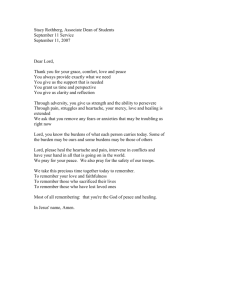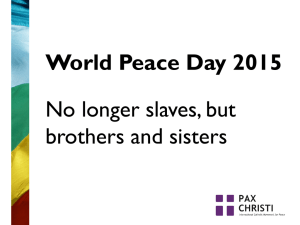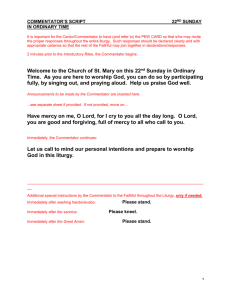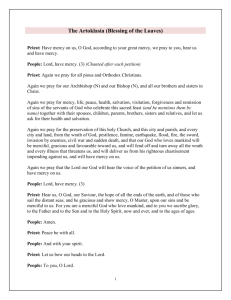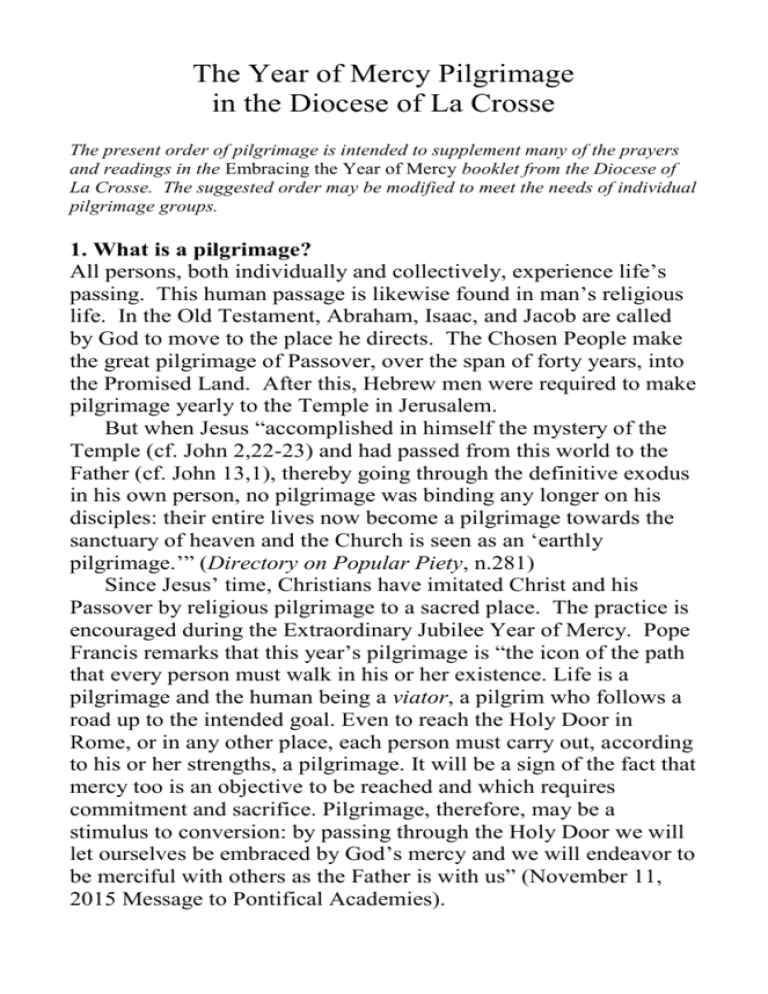
The Year of Mercy Pilgrimage
in the Diocese of La Crosse
The present order of pilgrimage is intended to supplement many of the prayers
and readings in the Embracing the Year of Mercy booklet from the Diocese of
La Crosse. The suggested order may be modified to meet the needs of individual
pilgrimage groups.
1. What is a pilgrimage?
All persons, both individually and collectively, experience life’s
passing. This human passage is likewise found in man’s religious
life. In the Old Testament, Abraham, Isaac, and Jacob are called
by God to move to the place he directs. The Chosen People make
the great pilgrimage of Passover, over the span of forty years, into
the Promised Land. After this, Hebrew men were required to make
pilgrimage yearly to the Temple in Jerusalem.
But when Jesus “accomplished in himself the mystery of the
Temple (cf. John 2,22-23) and had passed from this world to the
Father (cf. John 13,1), thereby going through the definitive exodus
in his own person, no pilgrimage was binding any longer on his
disciples: their entire lives now become a pilgrimage towards the
sanctuary of heaven and the Church is seen as an ‘earthly
pilgrimage.’” (Directory on Popular Piety, n.281)
Since Jesus’ time, Christians have imitated Christ and his
Passover by religious pilgrimage to a sacred place. The practice is
encouraged during the Extraordinary Jubilee Year of Mercy. Pope
Francis remarks that this year’s pilgrimage is “the icon of the path
that every person must walk in his or her existence. Life is a
pilgrimage and the human being a viator, a pilgrim who follows a
road up to the intended goal. Even to reach the Holy Door in
Rome, or in any other place, each person must carry out, according
to his or her strengths, a pilgrimage. It will be a sign of the fact that
mercy too is an objective to be reached and which requires
commitment and sacrifice. Pilgrimage, therefore, may be a
stimulus to conversion: by passing through the Holy Door we will
let ourselves be embraced by God’s mercy and we will endeavor to
be merciful with others as the Father is with us” (November 11,
2015 Message to Pontifical Academies).
2. At the Beginning of the Pilgrimage
The “Order for the Blessing of Pilgrims on Their Departure” is
found at n. 595 in the Book of Blessings and may be used by a
priest or deacon. The prayer itself is as follows:
All-powerful God,
you always show mercy toward those who love you
and you are never far away for those who seek you.
Remain with your servants on this holy pilgrimage
and guide their way in accord with your will.
Shelter them with your protection by day,
give them the light of your grace by night,
and, as their companion on the journey,
bring them to their destination in safety.
Through Christ our Lord.
R/. Amen.
Pilgrims should also become aware at this time of the Jubilee Year
Holy Doors, Pilgrimage Churches, and the Year of Mercy
Indulgence, which can be obtained by the Holy Year Pilgrimage.
See pages 72-77 of the Embracing the Year of Mercy booklet or
visit the diocesan website at www.diolc.org/mercy.
3. At the Entrance of the Pilgrimage Site (outside the entrance)
The Litany of the Saints can be sung or said as the pilgrims enter the
church.
Lord, have mercy.
Christ, have mercy.
Lord, have mercy.
Lord, have mercy.
Christ, have mercy.
Lord, have mercy.
Holy Mary, Mother of God:
Saint Michael:
Holy angels of God:
Saint John the Baptist:
Saint Joseph:
Saint Peter and Saint Paul:
Saint Andrew:
pray for us.
pray for us.
pray for us.
pray for us.
pray for us.
pray for us.
pray for us.
Saint John:
pray for us.
Saint Mary Magdalene:
pray for us.
Saint Stephen:
pray for us.
Saint Ignatius:
pray for us.
Saint Lawrence:
pray for us.
Saint Perpetua & Saint Felicity: pray for us.
Saint Agnes:
pray for us.
Saint Gregory:
pray for us.
Saint Augustine:
pray for us.
Saint Athanasius:
pray for us.
Saint Basil:
pray for us.
Saint Martin:
pray for us.
Saint Benedict:
pray for us.
Saint Francis and Saint Dominic: pray for us.
Saint Francis Xavier:
pray for us.
Saint John Vianney:
pray for us.
Saint Catherine of Siena:
pray for us.
Saint Teresa of Jesus:
pray for us.
All holy men and women, Saints of God:
pray for us.
Lord, be merciful:
Lord, deliver us, we pray.
From all evil:
Lord, deliver us, we pray.
From every sin:
Lord, deliver us, we pray.
From everlasting death:
Lord, deliver us, we pray.
By your coming as man:
Lord, deliver us, we pray.
By your death and rising to new life: Lord, deliver us, we pray.
By your gift of the Holy Spirit: Lord, deliver us, we pray.
Be merciful to us sinners:
Lord, we ask you, hear our prayer.
Guide and protect your holy Church: Lord, we ask you…
Keep the pope and all the clergy
in faithful service to your Church: Lord, we ask you…
Bring all peoples together
in trust and peace:
Lord, we ask you, hear our prayer.
Strengthen us in your service: Lord, we ask you, hear our prayer.
Jesus Son of the living God: Lord, we ask you, hear our prayer.
Christ, hear us:
Christ, graciously hear us:
Christ, hear us.
Christ, graciously hear us.
Let us pray. God of our ancestors who set their hearts on you, of
those who fell asleep in peace, and of those who won the martyrs’
violent crown: we are surrounded by these witnesses as by clouds
of fragrant incense. In this age we would be counted in this
communion of all the saints; keep us always in their good and
blessed company. In their midst we make every prayer through
Christ who is our Lord for ever and ever. Amen.
4. Scriptural Readings
Readings from sacred scripture are found, among other places, in
the Embracing the Year of Mercy booklet. Short reflection
questions are found at the end of each passage.
The Good Samaritan: Model of Mercy Luke 10:25-37, p.14
My soul rejoices in the Lord: Mary praises God for his
Mercy, Luke 1:46-55, p.28
The Prodigal Son is embraced by the Merciful Father,
Luke 15:11-32, p.36
The Merciful Savior forgives the Repentant Thief, Luke 23:
33-43, p.40
Jesus Forgives the Woman Caught in Adultery, John 8:211, p.44
Joseph forgives his brothers, Genesis 37, 39-46, p.50
Thanking God for his Mercy, Psalm 136, p.56
David begs God for his Mercy, Psalm 51, p.62
Zechariah Sings in Praise of God’s Mercy, Luke 1:57-79,
p.68
5. Devotional Prayers
Pilgrims may wish to pray together the Divine Mercy Chaplet or
the Litany of the Sacred Heart of Jesus. These are found in the
Embracing the Year of Mercy booklet on pages 22-23 and 34-35,
respectively.
6. Rite for Reconciliation of Several Penitents with
Individual Confession and Absolution
For the complete order, see Rite of Penance, nos. 48-59
INTRODUCTORY RITES
Song
Greeting
After the song the priest greets the congregation:
Grace, mercy, and peace be with you from God the Father
and Christ Jesus our Savior.
R/. And with your spirit.
Then the priest or another minister speaks briefly about the importance
and purpose of the celebration and the order of the service.
Opening Prayer
The priest invites all to pray, using these or similar words:
Brothers and sisters, God calls us to conversion; let us
therefore ask him for the grace of sincere repentance.
All pray in silence for a brief period. Then the priest says the prayer:
Lord, hear the prayers of those who call on you, forgive the
sins of those who confess to you, and in your merciful love
give us your pardon and your peace. Through Christ our Lord.
R/. Amen.
CELEBRATION OF THE WORD OF GOD
A form of the Liturgy of the Word follows, even if only a single reading.
The Homily concludes the readings.
Examination of Conscience
A period of time may be spent in making an examination of conscience
and in arousing true sorrow for sins. The priest, deacon, or another
minister may help the faithful by brief statements or a kind of litany,
taking into consideration their circumstances.
RITE OF RECONCILIATION
General Confession of Sins
The deacon or another minister invites all to kneel or bow, and to join in
saying a general formula for confession (e.g., “I confess to almighty
God…”). Then they stand and say a litany or sing an appropriate song.
The Lord’s Prayer is always added at the end.
I confess to almighty God
and to you, my brothers and sisters,
that I have greatly sinned,
in my thoughts and in my words,
in what I have done and in what I have failed to do,
And, striking their breast, they say:
through my fault, through my fault,
through my most grievous fault;
Then they continue:
therefore I ask blessed Mary ever-Virgin,
all the Angels and Saints,
and you, my brothers and sisters,
to pray for me to the Lord our God.
All say together:
Our Father…
The priest concludes:
Lord, draw near to your servants who in the presence of your
Church confess that they are sinners. Through the ministry of
the Church free them from all sin so that renewed in spirit they
may give you thankful praise. Through Christ our Lord.
R/. Amen.
Individual Confession and Absolution
Then the penitents go to the priests designated for individual confession,
and confess their sins. Each one receives and accepts a fitting act of
satisfaction and is absolved. After hearing the confession and offering
suitable counsel, the priest extends his hands over the penitent’s head (or
at least extends his right hand) and gives him absolution. Everything
else which is customary in individual confession is omitted.
Proclamation of Praise for God’s Mercy
When the individual confessions have been completed, the other priests
stand near the one who is presiding over the celebration. The latter
invites all present to offer thanks and encourages them to do good works
which will proclaim the grace of repentance in the life of the entire
community and each of its members. It is fitting for all to sing a psalm or
hymn or to say a litany in acknowledgment of God’s power and mercy,
for example, the canticle of Mary (Luke 1:46-55), or Psalm 136:1-9, 1314, 16, 25-26. See pages 28 and 56 of the Embracing the Year of Mercy
booklet for these latter prayers.
Concluding Prayer of Thanksgiving
After the song of praise or the litany, the priest concludes the common
prayer. He then blesses all present and dismisses them.
7. Hymn There’s a Wideness in God’s Mercy
Other suitable hymns: “I Heard the Voice of Jesus Say,” “Our
Father We Have Wandered,” Parce Domine.
8. Prayer of Blessing at the end of the Pilgrimage
The Order for the Blessing of Pilgrims Before or After their Return
is found at n. 606 in the Book of Blessings and may be used by a
priest or deacon. The prayer itself is as follows:
Blessed are you, O God,
Father of our Lord Jesus Christ.
From all races on the earth
you have chosen a people dedicated to you,
eager to do what is right.
Your grace has moved the hearts of these, your friends,
to love you more deeply and to serve you more generously.
We ask you to bless + them,
so that they may tell of your mercy
and give proof of it in their lives.
Through Christ our Lord.
R/. Amen.
Excerpts from the English translation of The Book of Blessings © 1987, International
Commission on English in the Liturgy Corporation, (ICEL); excerpts from the Rite of
Penance © 1974, 1975, ICEL. All rights reserved.
English translation of the Litany of the Saints copyright © 2006 Libreria Editrice
Viaticana. All rights reserved. The exclusive licensee in the United States is the United
States Conference of Catholic Bishops, Washington, D.C.


